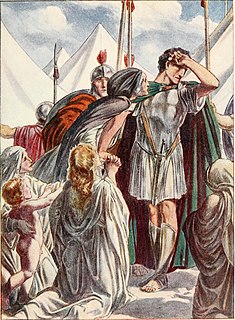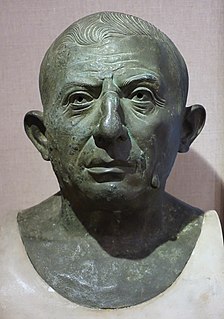Related Research Articles
The gens Acilia was a plebeian family at ancient Rome, that flourished from the middle of the third century BC until at least the fifth century AD, a period of seven hundred years. The first of the gens to achieve prominence was Gaius Acilius, who was quaestor in 203 and tribune of the plebs in 197 BC.

The gens Valeria was a patrician family at ancient Rome, prominent from the very beginning of the Republic to the latest period of the Empire. Publius Valerius Poplicola was one of the consuls in 509 BC, the year that saw the overthrow of the Tarquins, and the members of his family were among the most celebrated statesmen and generals at the beginning of the Republic. Over the next ten centuries, few gentes produced as many distinguished men, and at every period the name of Valerius was constantly to be found in the lists of annual magistrates, and held in the highest honour. Several of the emperors claimed descent from the Valerii, whose name they bore as part of their official nomenclature.
The gens Gabinia was a plebeian family at ancient Rome. Members of this gens first appear in the second century BC.
The gens Fulvia, originally Foulvia, was one of the most illustrious plebeian families at ancient Rome. Members of this gens first came to prominence during the middle Republic; the first to attain the consulship was Lucius Fulvius Curvus in 322 BC. From that time, the Fulvii were active in the politics of the Roman state, and gained a reputation for excellent military leaders.

The gens Manlia was one of the oldest and noblest patrician houses at Rome, from the earliest days of the Republic until imperial times. The first of the gens to obtain the consulship was Gnaeus Manlius Cincinnatus, consul in 480 BC, and for nearly five centuries its members frequently held the most important magistracies. Many of them were distinguished statesmen and generals, and a number of prominent individuals under the Empire claimed the illustrious Manlii among their ancestors.

The gens Marcia, occasionally written Martia, was one of the oldest and noblest houses at ancient Rome. They claimed descent from the second and fourth Roman Kings, and the first of the Marcii appearing in the history of the Republic would seem to have been patrician; but all of the families of the Marcii known in the later Republic were plebeian. The first to obtain the consulship was Gaius Marcius Rutilus in 357 BC, only a few years after the passage of the lex Licinia Sextia opened this office to the plebeians.
The gens Terentia was a plebeian family at ancient Rome. Dionysius mentions a Gaius Terentilius Arsa, tribune of the plebs in 462 BC, but Livy calls him Terentilius, and from inscriptions this would seem to be a separate gens. No other Terentii appear in history until the time of the Second Punic War. Gaius Terentius Varro, one of the Roman commanders at the Battle of Cannae in 216 BC, was the first to hold the consulship. Members of this family are found as late as the third century AD.

The gens Sempronia was one of the most ancient and noble houses of ancient Rome. Although the oldest branch of this gens was patrician, with Aulus Sempronius Atratinus obtaining the consulship in 497 BC, the thirteenth year of the Republic, but from the time of the Samnite Wars onward, most if not all of the Sempronii appearing in history were plebeians. Although the Sempronii were illustrious under the Republic, few of them attained any importance or notice in imperial times.

The gens Minucia was an ancient Roman family, which flourished from the earliest days of the Republic until imperial times. The gens was apparently of patrician origin, but was better known by its plebeian branches. The first of the Minucii to hold the consulship was Marcus Minucius Augurinus, elected consul in 497 BC.

The gens Porcia, rarely written Portia, was a plebeian family at Ancient Rome. Its members first appear in history during the third century BC. The first of the gens to achieve the consulship was Marcus Porcius Cato in 195 BC, and from then until imperial times, the Porcii regularly occupied the highest offices of the Roman state.

The gens Caecilia was a plebeian family at ancient Rome. Members of this gens are mentioned in history as early as the fifth century BC, but the first of the Caecilii who obtained the consulship was Lucius Caecilius Metellus Denter, in 284 BC. The Caecilii Metelli were one of the most powerful families of the late Republic, from the decades before the First Punic War down to the time of Augustus.
The gens Caesennia was an Etruscan family from Tarquinii during the late Roman Republic and in imperial times. Two of its members were mentioned by Cicero, and the name is found in sepulchral inscriptions.

The gens Pomponia was a plebeian family at ancient Rome. Its members appear throughout the history of the Roman Republic, and into imperial times. The first of the gens to achieve prominence was Marcus Pomponius, tribune of the plebs in 449 BC; the first who obtained the consulship was Manius Pomponius Matho in 233 BC.
The gens Rutilia was a plebeian family at ancient Rome. Members of this gens appear in history beginning in the second century BC. The first to obtain the consulship was Publius Rutilius Rufus in 105 BC.

The gens Juventia, occasionally written Jubentia, was an ancient plebeian family at Rome. After centuries of obscurity, the gens emerges into history with the appearance of Titus Juventius, a military tribune, in the beginning of the second century BC. The first of the Juventii to obtain the consulship was Marcus Juventius Thalna in 163 BC. But the family is renowned less for its statesmen than for its jurists, who flourished during the second century AD.
The gens Maenia, occasionally written Mainia, was a plebeian family at ancient Rome. Members of this gens are first mentioned soon after the establishment of the Republic, and occur in history down to the second century BC. Several of them held the position of tribune of the plebs, from which they strenuously advocated on behalf of their order. The most illustrious of the family was Gaius Maenius, consul in 338 BC, and dictator in both 320 and 314. In some manuscripts, the nomen Maenius appears to have been erroneously substituted for Menenius or Manlius; there are also instances of confusion with Manilius, Maelius, and Maevius.
The gens Oppia was an ancient Roman family, known from the first century of the Republic down to imperial times. The gens may originally have been patrician, as they supplied priestesses to the College of Vestals at a very early date, but all of the Oppii known to history were plebeians. None of them obtained the consulship until imperial times.
The gens Perperna, also found as Perpenna, was a plebeian family at ancient Rome. Members of this gens first appear in history during the second century BC, and Marcus Perperna obtained the consulship in 130 BC.

The gens Plautia, sometimes written Plotia, was a plebeian family at ancient Rome. Members of this gens first appear in history in the middle of the fourth century BC, when Gaius Plautius Proculus obtained the consulship soon after that magistracy was opened to the plebeian order by the lex Licinia Sextia. Little is heard of the Plautii from the period of the Samnite Wars down to the late second century BC, but from then to imperial times they regularly held the consulship and other offices of importance. In the first century AD, the emperor Claudius, whose first wife was a member of this family, granted patrician status to one branch of the Plautii.

The gens Publicia, occasionally found as Poblicia or Poplicia, was a plebeian family at ancient Rome. Members of this gens are first mentioned in history during the period following the First Punic War, and the only one to achieve the consulship was Marcus Publicius Malleolus in 232 BC.
References
- 1 2 Dictionary of Greek and Roman Biography and Mythology, vol. II, p. 917 ("Manilia Gens").
- ↑ Chase, pp. 123, 125, 155, 156.
- ↑ Livy, iii. 51.
- ↑ Dionysius, xi. 44.
- ↑ Broughton, vol. I, pp. 49, 50.
- ↑ Broughton, vol. I, pp. 382, 383 (note 1).
- ↑ Livy, xlv. 17.
- ↑ Broughton, vol. I, p. 435.
- ↑ Dictionary of Greek and Roman Biography and Mythology, vol. II, p. 917 ("Marcus Manlius").
- ↑ Livy, Epitome 49.
- ↑ Florus, ii. 15.
- ↑ Appian, Punica, 75–109.
- ↑ Cicero, De Republica, i. 9, 12, 48, iii. 10, 33; Brutus 28.
- ↑ Digesta, 1. tit. 2. s. 1. § 39.
- ↑ Broughton, vol. I, p. 458.
- ↑ Florus, iii. 19.
- ↑ Orosius, v. 6.
- ↑ Broughton, vol. I, p. 486.
- ↑ Broughton, pp. 523, 525 (note 1).
- ↑ Badian, p. 384.
- ↑ Cassiodorus, Chronica.
- ↑ Sallust, Bellum Jugurthinum, 73.
- ↑ Gellius, vi. 11.
- ↑ Broughton, vol. I, p. 551.
- ↑ Orosius, v. 22.
- ↑ Livy, Epitome, 90.
- ↑ Plutarch, "The Life of Sertorius", 12.
- ↑ Velleius Paterculus, ii. 33.
- ↑ Cicero, Pro Lege Manilia.
- ↑ Cassius Dio, xxxvi. 25–27.
- ↑ Livy, Epitome 100.
- ↑ Appian, Bella Mithridatica, 97.
- ↑ Plutarch, "The Life of Pompeius", 30; "The Life of Lucullus", 35; "The Life of Cicero", 9.
- ↑ Asconius, In Ciceronis Cornelio, pp. 50, 75 (ed. Orelli).
- ↑ Quintus Cicero, De Petitione Consulatus, 13.
- ↑ Asconius, In Ciceronis Milone, p. 38 (ed. Orelli).
- ↑ Dictionary of Greek and Roman Biography and Mythology, vol. II, p. 918 ("Manilius").
- ↑ Varro, De Lingua Latina, p. 130 (ed. Müller).
- ↑ Latin Anthology, iii. 245, No. 33 (ed. Meyer).
- ↑ CIL XIV, 4242.